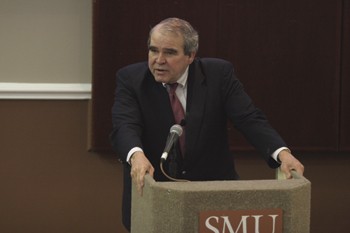
David Soloman speaks about the crisis in American medicine. (Daneya Ammon)
Last night the Notre Dame Club of Dallas and the SMU Catholic Campus Ministry sponsored a Hesburgh Lecture to discuss, “American Medicine: Is there any chance for health care reform?” Professor David Soloman from University of Notre Dame spoke and outlined the health-care crisis and hopeful solutions for the future.
“We have the best system that has ever existed because we have the best medical universities and hospitals, but something is deeply wrong because the second main concern for Americans, after the War in Iraq, are health-care prices,” Soloman said.
Twenty-nine percent of Americans say health care is their main concern. Soloman explained the real problems are about the cost of health care. He gave examples by using statistics from the 1950s. At that time, the U.S. only spent five percent of the gross domestic product on health care. Today that number is 17 percent.
Soloman said that the situation is a problem for individuals as well as society.
He then looked at the history of health care, saying, “Back in the early 1900’s the poor people were the lucky ones. They didn’t have to go to the doctor because the doctors couldn’t do anything that helped anybody.”
Another issue he discussed is referred to as the “terrible triangle.” There is an unequal balance between the providers, patients and payers of health care. This triangle becomes a problem because most people are not paying for their health-care bills because it is taken care of by other entities like the government and insurance companies. As a result, these entities are paying more than needed for patients to seek health care.
He then discussed the future of health care. The United States has Health Maintenance Organizations (HMOs) to help the system. However, according to Solomon, “the health-care system will run out of money.”
There are also Wellness Programs to prevent illness but Soloman said these programs will not help the system because the longer people live, the more they spend on health care. He believes the solution will come with a new generation of physicians who will take back the medical profession.
Whatever the solution is, there will have to be a reform that is both effective socially and accepted politically, he said.
Continuing Education Advisor Ann Middendorf said the lecture offered unique insights on an important issue.
“Soloman is very insightful and offered a very intelligent way to approach an extremely emotional, volatile issue,” she said.








